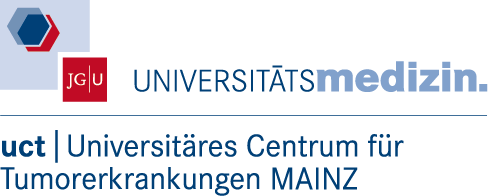Oncogenic Pathways

Oncogenic signaling represents a hallmark in carcinogenesis and is intimately linked to cancer therapy. Many small molecules like tyrosine kinase inhibitors target oncogenic pathways, e.g. RAS-RAF-MAPK, and are already approved by regulatory authorities. Moreover, DNA damage response, DNA repair as well as epigenetic regulation of gene expression are tightly regulated by a cascade of signaling events. Importantly, inhibition of signaling pathways within systemic treatment strategies does not affect tumor cells only, but also modulates the tumor-host-interface, e.g. immune cells located in the tumor microenvironment. In this core area, i) we want to understand the effect of systemic therapy on different cellular compartments; ii) the composition of chromatin complexes in cancer cells in the context of rewired signaling; and iii) whether targeting of oncogenic pathways results in convergence or antagonism with respect to cancer cell outcome.
The major aim of the UCT Mainz program Oncogenic Pathways is to develop novel and rationale combination therapies in close collaborations with the core area Cancer Immunotherapy. Further, an IIT-concept to target DNA repair in KRASmut lung cancer patients is under evaluation.
Research Groups
- Research group Kühn - Emmy Noether group
- Research group Möhler
- Research group Rajalingam
- Research group Roos
- Research group Sasca - Emmy Noether group
- Research group Stauber
- Research group Strand
- Research group Straub
- Research group Tagscherer
- Research group Tomicic-Christmann
- Research group Wojnowski
- Research group Zahnreich
Most significant publications since 2019
Foersch, S., Glasner, C., Woerl, A.C., Eckstein, M., Wagner, D.C., Schulz, S., Kellers, F., Fernandez, A., Tserea, K., Kloth, M., Hartmann, A., Heintz, A., Weichert, W., Roth, W., Geppert, C., Kather, J.N., Jesinghaus, M. 2023. Multistain deep learning for prediction of prognosis and therapy response in colorectal cancer. Nat Med. 29(2), 430-439.
Gül, D., Krämer, O.H., Reinhardt, C. 2023. Starving out brain tumors: a reprogrammed lysine catabolism serves as a novel target for glioblastoma treatment. Signal Transduct Target Ther. 8(1), 401.
- Cortés-López, M., Schulz, L., Enculescu, M., Paret, C., Spiekermann, B., Quesnel-Vallières, M., Torres-Diz, M., Unic, S., Busch, A., Orekhova, A., Kuban, M., Mesitov, M., Mulorz, M.M., Shraim, R., Kielisch, F., Faber, J., Barash, Y., Thomas-Tikhonenko, A., Zarnack, K., Legewie, S., König, J. 2022. High-throughput mutagenesis identifies mutations and RNA-binding proteins controlling CD19 splicing and CART-19 therapy resistance. Nat Commun. 13(1), 5570.
Mooz, J., Riegel, K., Ps, H., Sadanandam, A., Marini, F., Klein, M., Werner, U., Roth, W., Wilken-Schmitz, A., Tegeder, I., Rajalingam, K. 2022. ARAF suppresses ERBB3 expression and metastasis in a subset of lung cancers. Sci Adv. 8(11), eabk1538.
Liebl, M.C., Moehlenbrink, J., Becker, H., Raddatz, G., Abdeen, S.K., Aqeilan, R.I., Lyko, F., Hofmann, T.G. 2021. DAZAP2 acts as specifier of the p53 response to DNA damage. Nucleic Acids Res. 49(5), 2759-2776.
Foersch, S., Eckstein, M., Wagner, D.C., Gach, F., Woerl, A.C., Geiger, J., Glasner, C., Schelbert, S., Schulz, S., Porubsky, S., Kreft, A., Hartmann, A., Agaimy, A., Roth, W. 2021. Deep learning for diagnosis and survival prediction in soft tissue sarcoma. Ann Oncol. 32(9), 1178-1187.
- Dzama, M.M., Steiner, M., Rausch, J., Sasca, D., Schönfeld, J., Kunz, K., Taubert, M.C., McGeehan, G.M., Chen, C.W., Mupo, A., Hähnel, P., Theobald, M., Kindler, T., Koche, R.P., Vassiliou, G.S., Armstrong, S.A., Kühn, M.W.M. 2020. Synergistic targeting of FLT3 mutations in AML via combined menin-MLL and FLT3 inhibition. Blood. 136(21), 2442-2456.
- Krishnan, A., Berthelet, J., Renaud, E., Rosigkeit, S., Distler, U., Stawiski, E., Wang, J., Modrusan, Z., Fiedler, M., Bienz, M., Tenzer, S., Schad, A., Roth, W., Thiede, B., Seshagiri, S., Musholt, T.J., Rajalingam, K. 2020. Proteogenomics analysis unveils a TFG-RET gene fusion and druggable targets in papillary thyroid carcinomas. Nat Commun. 11(1), 2056.
- Sasca, D., Szybinski, J., Schüler, A., Shah, V., Heidelberger, J., Haehnel, P.S., Dolnik, A., Kriege, O., Fehr, E.M., Gebhardt, W.H., Reid, G., Scholl, C., Theobald, M., Bullinger, L., Beli, P., Kindler, T. 2019. NCAM1 (CD56) promotes leukemogenesis and confers drug resistance in AML. Blood. 133(21):2305-2319.
- Gronke, K., Hernández, P.P., Zimmermann, J., Klose, C.S.N., Kofoed-Branzk, M., Guendel, F., Witkowski, M., Tizian, C., Amann, L., Schumacher, F., Glatt, H., Triantafyllopoulou, A., Diefenbach, A. 2019. Interleukin-22 protects intestinal stem cells against genotoxic stress. Nature. 566(7743):249-253.


 International Medical Services
International Medical Services
